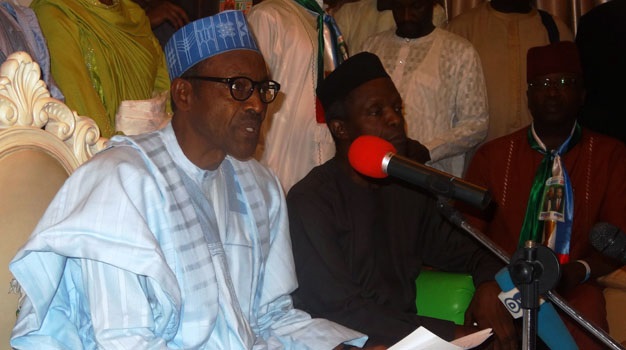President Muhammadu Buhari has so much political capital, he can do no wrong. At least not yet, almost a year into his “extended stay” political honeymoon. But his chest of ‘monetary capital’ is another story. With crude oil – the country’s major earner, hovering between 32 and 37 dollars a barrel, the administration is cash strapped, even as his economic team struggle to fashion a workable economic formulae devoid of the yesteryears of corrupt indiscretions, sticky points may yet prove tricky to tame.
At the heart of his change mantra is the need for new policies that depart from the old ways which has produced nothing but misery for the 170 million Nigerians, in lack of jobs and economic stagnation in the mist of crude oil wealth which has benefited a few connected to those in power during past administrations. But for Pres. Buhari, this is a familiar road, albeit one that is cratered and carelessly mined in banana peels by political friends and foes alike. It doesn’t help that the last time he travelled down the anti-corruption path in 1983, as a military head of state, that trip was truncated by allies, literally cut from the same cloth, and uniform, fellow officers of the Nigeria Army.
Now, in his second coming as an elected civilian President, he has vowed to stem the systemic corruption that has nearly crippled the country, and, President Buhari is taking Nigerians where none had gone before; putting previous untouchables including serving and retired generals on trial for corrupt embezzlement. However, even with arteries of corruption finally excised from draining the nation’s treasury, the existing policies lacks the grit to reposition a deficient infrastructure and manufacturing base – twin hurdles the country must overcome to see cathartic relief from crushing unemployment, insecurity and poverty.
Of late, the intense prophesizing coming from Aso villa – the nation seat of power, convey the need to wean the country off its appetite for crude oil earning by growing revenues from non-oil sectors such as agriculture and mining. In fact, the president cannot find enough platforms to warn Nigerians that the path to economic salvation lies in “growing earnings from agriculture and mining”.
This notion that increasing the nation’s revenue base by “digging up” more extractives for export, will guarantee a messianic path to economic freedom is a joke taken too far. And it reaffirms an inability and/or unwillingness to rescue the country from its red-collar servitude. A failure to recognize that the fundamentals, as currently defined, of growing the economy without a vibrant manufacturing base, are all but absent.
Just a hair shy of sixty years, since Nigeria exported its first crude oil from the Oloibiri oil field and half a trillion dollars earned, the absence of any significant investment in forward and backward linkages in the Oil industry to grow the secondary sector (manufacturing), tertiary sector (services), quaternary sector (information services) and quinary sector (human services), all but guarantee their stagnation. The culprit? A national economic compass that places premium on harvesting primary sector resources for earnings, and the immediacy of its CONSUMPTION.
This is the most important and missing or weak link in Nigeria economic policies; a patent disconnect of its primary extractive activities from related manufacturing components – a distortion which has grown the country’s import list into a sad commentary on acquired-taste dependency.
It is pertinent that the Buhari administration recognize in their policy formulation, the importance of secondary ‘uptakers’ of the primary extractives they intend to stimulate in the agriculture and mining sectors. Apart from the fact that they have “the biggest positive impact on wage employment” as recently reported by International Labor Organization (ILO), increasing capacity utilization directly impact employment, improved standard of living, wealth creation, and global competitiveness.
For instance; as the largest importer and consumer of tomato puree in Africa, Nigeria loses significant foreign exchange; a grave concern to the current administration. However, promoting industrial scale cultivation of tomatoes without a deliberate policy inclusiveness of tomatoes paste manufacturers with a clear blueprint on forward and backward linkages, and supporting interventionist policy – an importation ban on foreign tomatoes paste products, is a recipe for disaster and counter-productive. Rather, the new agricultural policy must incorporate incentives for manufacturers to encourage their backward integration efforts and supports for farmers at the base of the supply chain.
To be clear, unless the current administration injects a healthy dose of vision and sagacity into the structuring and implementation of a robust industrial policy, it may soon fall into the hellish pit of economic circumlocution as was the lot of past administrations.



